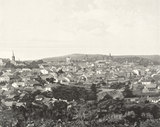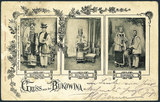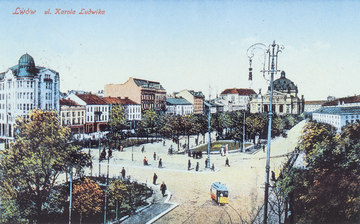-

Czernowitz: View of the town, photograph, around 1898
Copyright: Schloß Schönbrunn Kultur-und Betriebsges.m.b.H./Fotograf: Alexander E. Koller
-

“Greetings from the Bukovina”, correspondence card, 1902
Copyright: IMAGNO/Austrian Archives
-

Kazimir Pochwalski: Jews from Kraków and surroundings, illustration
Copyright: Schloß Schönbrunn Kultur-und Betriebsges.m.b.H./Fotograf: Alexander E. Koller
Galicia and Bukovina are territories we might seek in vain on the map today. Seen from the coeval perspective of the Viennese central authority, these countries were deemed to be obscure marginal regions: as “Semi-Asia” or “Wild East”, they were regarded as the “poorhouse” of the Monarchy.
Galicia and Bukovina lay on the borderline between the Latin-Catholic and Byzantine-Orthodox worlds. In geopolitical terms, this territory was strategically important for the Habsburg Monarchy in the contest with Russia for domination in the Eastern Central-European region. European Great Power politics had created new borders here that paid no attention to ethnic and linguistic circumstances, splitting Polish, Ukrainian-Ruthenian and Romanian settlement areas. Those belonging to the same linguistic group now found themselves on either side of the border between states that were not always on particularly friendly terms with each other.
The Kingdom of Galicia was an artificially created territorial unit that first came under Habsburg rule as a consequence of the Polish Partitions of 1772 and 1795. Prior to this, the region was an integral part of the Polish kingdom and therefore traditionally Polish in character, although the country was an ethnic mix and, besides Poles, had a high proportion of Ukrainian-Ruthenians in its population.
The capital of Galicia was Lemberg (Polish Lwów, Ukrainian Львів/Lviv). The ancient royal city of Krakow was a further cultural centre. The bourgeoisie population was Polish in the main, meanwhile there was a palpable German influence and, especially in the eastern regions, Armenian. Playing an outstanding role in Galician towns and cities were the Jewish communities, numerically very strong. Around 11 % of the population in Galicia professed their allegiance to the Mosaic faith.
National, economic and denominational polarities were very closely interwoven in Galicia. The Poles claimed the leading role in this region. They dominated in many respects; they saw a quintessence of their national identity in Latin Catholicism, while the profession of faith to the Greek-Catholic Church (a Church united with Rome accepting the primacy of the Pope while retaining the Orthodox rite) defined an allegiance to the Ruthenian-Ukrainian ethnic group.
A strong connection existed between social status and ethnic-linguistic allegiance. Thus those who belonged to the social élites professed their allegiance to the Polish tradition, regardless of actual ethnic background. The dominance of the magnates and numerous Polish or Polish-oriented landed gentry (szłachta) over the masses of rural subjects was oppressive. The densely populated country struggled with many social problems. The major part of the land was in the hands of the feudal aristocracy, while the economic situation of the small farmers and petty peasantry in the villages was catastrophic. Many who owned nothing languished in the shadow of the aristocratic estates merely as lessees or labourers. The rural population, suffering under extreme need for land, remained indifferent to the idea of nationality – solving social problems was a more burning issue than the question of national development.
Bukovina was annexed by Austria in 1775. Prior to this, the region was a peripheral part of the Ottoman Empire. In this extremely backward and structurally weak land the Austrian authorities carried out the experiment of a quasi-colonial takeover of the country by means of a centralist administration with German as official and educational language. Because of the long Ottoman rule there was no local aristocracy and no self-administration through social estates, hence no attention had to be paid to historical rights. Under military administration at the start until 1786, Bukovina was administered later in part together with Galicia. The population consisted of Romanians, Ukrainians, Germans and Poles, also Armenians, without any ethnic group forming a dominant majority. The proportion of the Jewish population was the highest of all the Crown lands of the Habsburg Monarchy at 13 %.
The capital Czernowitz (Ukrainian Чернівці/Černivc, Romanian Cernăuţi) was a mirror of the colourful ethnic mix of the country. In 1910 it had around 90,000 inhabitants, of whom 48.4 % gave German, 17.9 % Ruthenian and 15.7 % Romanian as their vernacular language. As regards denominations, the high proportion of Jews (32.8 %) was remarkable. The astonishingly high percentage of German speakers was due to them; they made the “Jerusalem on the Prut” into one of the leading German cultural centres in the East – it had also had a German-language university since 1875. The assimilated Jewish bourgeoisie oriented itself culturally on Vienna, which endowed Czernowitz the title of “Klein Wien” – “Little Vienna”.
Translation: Abigail Prohaska
Batowski, Henryk: Die Polen, in: Wandruszka, Adam/Urbanitsch, Peter (Hrsg.): Die Habsburgermonarchie 1848–1918, Band III: Die Völker des Reiches, Wien 1980, Teilband 1, 522–554
Bihl, Wolfdieter: Die Ruthenen, in: Wandruszka, Adam/Urbanitsch, Peter (Hrsg.): Die Habsburgermonarchie 1848–1918, Band III: Die Völker des Reiches, Wien 1980, Teilband 1, 555–584
Hoensch, Jörg K.: Geschichte Polens. (3. Auflage), Stuttgart 1998
Rumpler, Helmut: Eine Chance für Mitteleuropa. Bürgerliche Emanzipation und Staatsverfall in der Habsburgermonarchie [Österreichische Geschichte 1804–1914, hrsg. von Herwig Wolfram], Wien 2005
Slawinski, Ilona/Strelka, Joseph P. (Hrsg): Die Bukowina. Vergangenheit und Gegenwart, Berlin 1995
-
Chapters
- Poles and Ruthenians in the Habsburg Monarchy
- At the Margins of the Empire: Galicia and Bukovina
- The struggle of the Poles for their nation: Poland is not yet lost!
- Compromise with Vienna: Polish Autonomy in Galicia
- The Poles in the First World War: a Nation as Football for the Great Powers
- The Great Unknown: The Ruthenians
- Approach and Rejection: The Ruthenians between Austria and Russia


